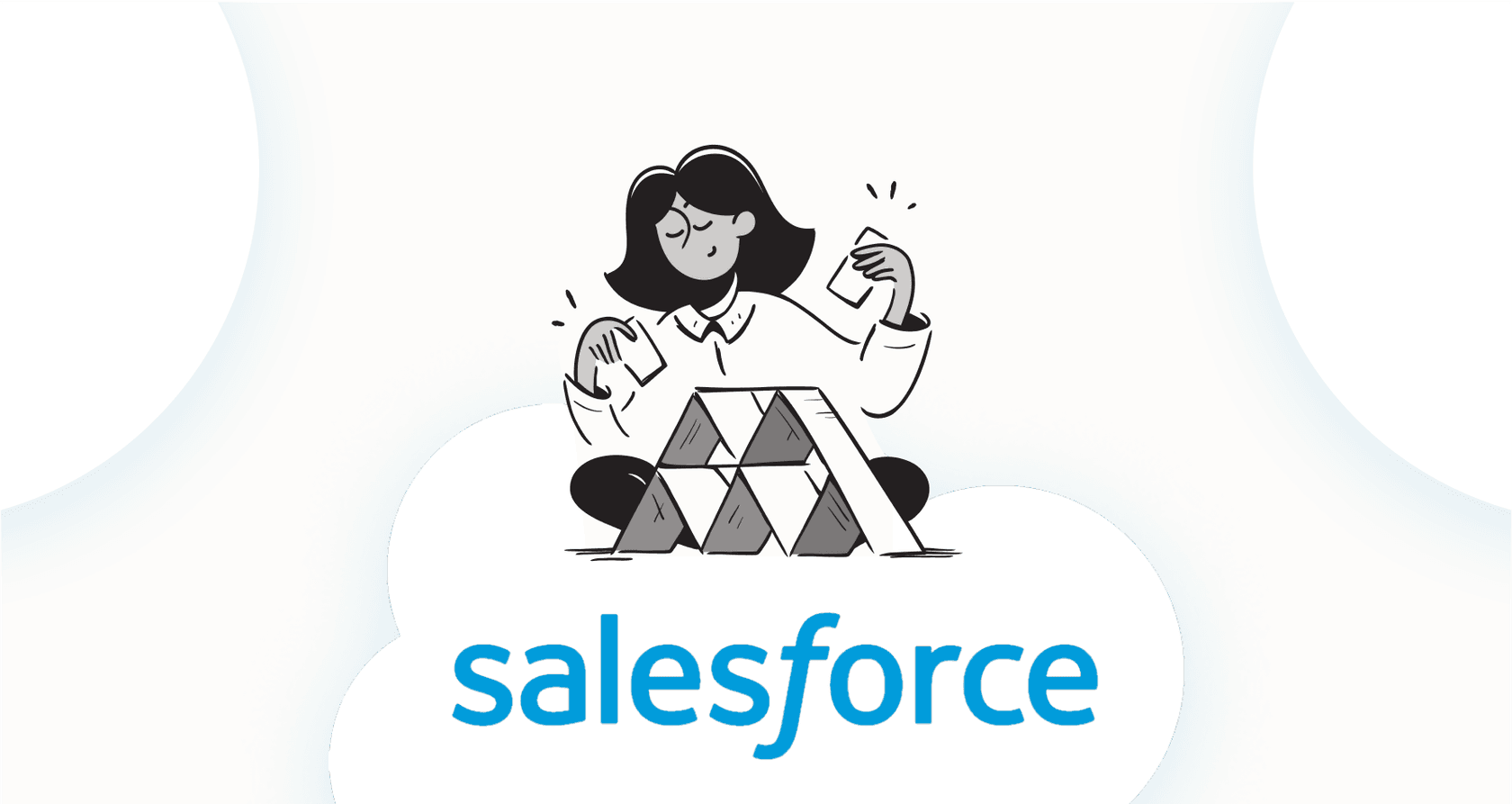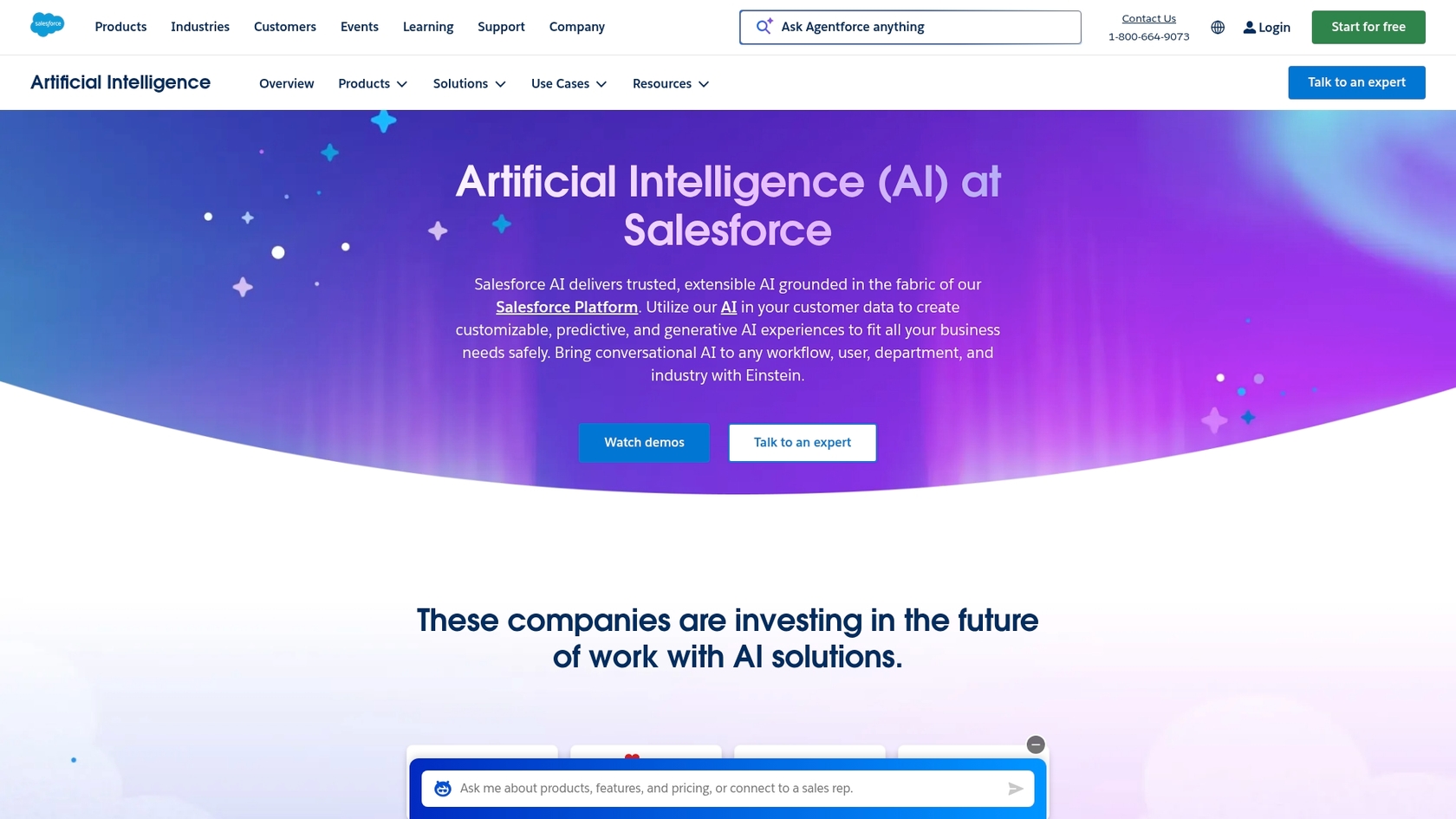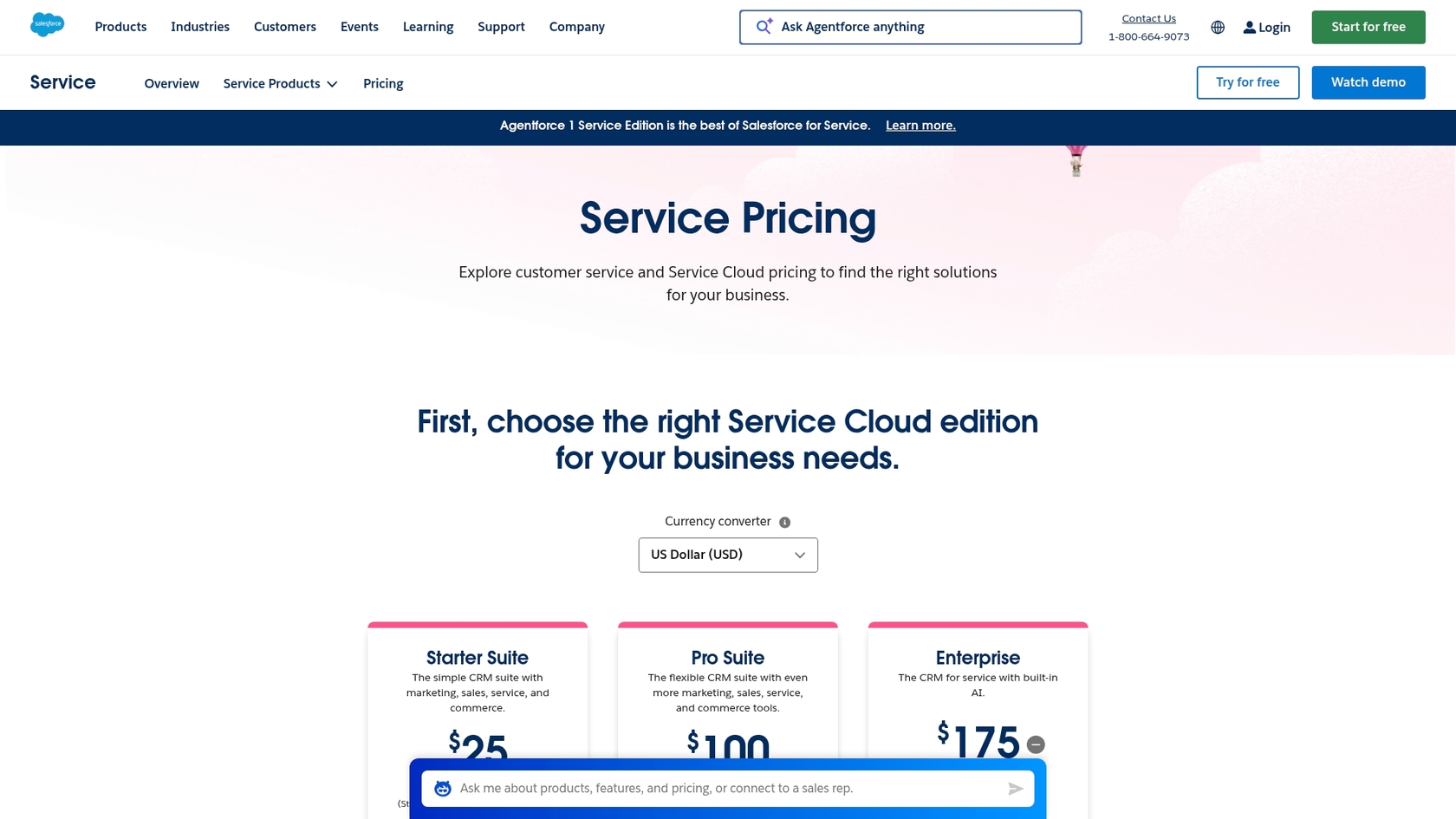
Everyone's heard of Salesforce. It’s a giant in the business software world for a reason, and tons of companies rely on it for their CRM. But customer support is changing fast. People expect quick, smart answers, and support teams are looking for tools that can keep up. So, is a massive, all-in-one platform like Salesforce still the best choice for the job?
This guide gives you an honest look at using Salesforce for customer service, specifically its Service Cloud platform. We’ll cover the main features, try to make sense of the complicated pricing, and talk about the real-world problems teams often face. Salesforce is powerful, no doubt. But we'll also explore simpler ways to add AI and automation to your workflow without tearing everything down and starting over.
What is Salesforce for customer service?
When you hear Salesforce for customer service, people are usually talking about Salesforce Service Cloud. It’s basically a beefed-up CRM designed to help your team handle customer questions, keep track of support tickets, and manage all your service operations in one place, no matter how a customer reaches out.
The big promise is giving you a "360-degree view" of your customer. The idea is to pull all your customer data, from their purchase history to their last marketing email click, into one spot. That way, when an agent picks up a ticket, they see the whole story and can give better, more personal support. It’s all about connecting your service team to the rest of the company to break down those frustrating info silos. At its core, it's about managing cases, routing them to the right people, and building up a library of knowledge to solve problems faster.
Key features of Salesforce for customer service
Service Cloud is loaded with features to manage the entire support process. Let's look at the most important ones.
Case management and service console
The Service Console is your agent's home base. It's a single dashboard where they can see every case, customer history, and all the important details without constantly switching tabs. Agents can track, manage, and solve customer issues coming in from any channel. It's a solid way to keep everything organized.

The only catch? The console is only as good as the data you have inside Salesforce. If your real knowledge lives elsewhere, like a Confluence wiki, internal guides in Google Docs, or Notion pages, your agents are still stuck hunting for answers in other tabs. This is where a more connected tool like eesel AI comes in handy. It plugs into the tools you already use, pulling knowledge from all those external places right into your agent's workflow.
Omnichannel routing and automation
Salesforce’s omnichannel routing is built to send the right question to the right agent, quickly. It can automatically route emails, chats, or social media messages to agents based on their skills or availability. It also has workflow automation to handle simple, repetitive tasks like sending "we got your email" confirmations.
But getting those rules set up is rarely a simple click-and-go process. You often need a certified Salesforce admin or even a developer to get it configured, which can be slow and expensive. That's a big difference from the approach taken by eesel AI, where you can set up automation for certain tickets yourself in just a few minutes from a simple dashboard. No coding, no sales calls needed.
Knowledge management and AI with Einstein
Salesforce has a built-in knowledge base for creating and sharing support articles. This is powered by Einstein, its own AI engine. Einstein can suggest articles to agents while they're working and run basic chatbots on your help portal.

The main issue here is that Einstein mostly learns from data already inside Salesforce. That means your CRM data and the articles you've manually created. This can create a knowledge silo. An AI is only as smart as the information it has access to, and cutting it off from your company's real knowledge hubs is a major disadvantage. In contrast, a tool like eesel AI connects to all your knowledge sources right away. It learns from past tickets in your helpdesk, internal wikis, shared documents, and more, giving it the context to provide much more accurate answers. It can even help you build out your knowledge base by drafting articles based on your team's most successful ticket resolutions.
Pricing and plans

Alright, let's talk pricing. And let's be honest: Salesforce pricing is famously complicated. Between the different tiers, a bunch of add-ons, and a preference for annual contracts, figuring out the true cost can be a headache. All plans are billed annually, so you're looking at a pretty big upfront investment.
Here's a breakdown of the standard Service Cloud plans. Just remember that many of the features you might expect, especially around AI and automation, are often saved for the pricier tiers.
| Plan | Price (per user/month, billed annually) | Key Features |
|---|---|---|
| Starter Suite | $25 | Case Management, Knowledge (Read-Only), Customizable Reports. |
| Pro Suite | $100 | Everything in Starter + Real-Time Chat, Sales Quoting, Greater Customization. |
| Enterprise | $175 | Everything in Pro + Built-in AI, Self-Service Help Center, Workflow Automation. |
| Unlimited | $350 | Everything in Enterprise + Chat & Bots, 24/7 Support, Full Sandbox. |
| Einstein 1 Service | $550 | Everything in Unlimited + Full Suite of AI, Digital Channels, Slack Integration, Tableau Next. |
You can get more details on the official Salesforce Service Cloud Pricing page.
What this table doesn't spell out are the hidden costs. You'll often find that key features like advanced AI or chatbots require you to be on a more expensive plan or to buy them as separate add-ons. You also have to think about costs for data storage, API limits, and, more often than not, hiring consultants just to get it all set up and working.
This is where a different pricing model can be a relief. For example, eesel AI has transparent, predictable pricing with no fees per resolution. Your bill won't suddenly jump after a busy month. Plus, a monthly plan gives you the freedom to test things out and see the value before locking into a long-term contract.
Hidden costs and challenges
While Salesforce is a market leader, its all-in-one approach has some serious trade-offs that are worth thinking about before you jump in.
Long implementation times
Salesforce isn't something you just turn on. A typical setup can take months and often requires a team of certified consultants and a dedicated internal admin to get it right. The time and money needed to just get started can be huge, which means you're waiting a long time to see any benefit.
This is the complete opposite of a tool like eesel AI, which is built to "go live in minutes, not months." With one-click integrations for helpdesks like Zendesk and Intercom, you can start seeing results almost immediately. No mandatory demos or long sales calls needed.
The 'rip and replace' problem
The Salesforce model works best when your whole company is using its products. This can create a strong vendor lock-in, pushing you to move away from other great tools your team already uses and likes, whether it's Slack for team chat or Confluence for documentation.
eesel AI is the anti-"rip and replace" solution. It's designed to plug right into your existing tech stack. You don't have to switch your workflows or give up the tools that already work for you. You just add a smart AI layer on top that connects your systems and makes your whole setup work better.
Rigid and complex automation
While Salesforce does offer automation, getting it to handle specific support workflows can be difficult and inflexible. Its AI is definitely powerful, but it’s stuck inside the Salesforce ecosystem, learning only from the data and processes you have in there. This can give you less control than you'd expect.
In contrast, a tool like eesel AI is all about giving you total control. You get to choose exactly which tickets the AI should handle and which it should pass to a human. You can create a custom AI persona, set its tone of voice, and build custom workflows that do things like look up order details in Shopify or update ticket fields in your helpdesk. Best of all, eesel AI’s powerful simulation mode lets you test your setup on thousands of your past tickets. This gives you a real forecast of your automation rate and ROI before you ever turn it on for your customers, a feature you won't find in most big platforms.
Is Salesforce for customer service right for your service team?
So, is Salesforce for customer service the right call for your team? It's an incredibly powerful platform, for sure. If you're a huge company that's already all-in on the Salesforce ecosystem and has the budget for a long, resource-heavy setup, it can be a solid choice.
But for most teams that need to be nimble, flexible, and see a return on their investment quickly, a dedicated AI tool is a much smarter move. You get all the power of modern AI and automation without the massive overhead, complexity, and vendor lock-in of a full CRM migration.
This video explains how Salesforce Service Cloud can be the right choice for your customer service team.
A smarter way to automate your customer service
If you're looking for powerful, customizable AI that works with the helpdesk and knowledge bases you already have, check out eesel AI. It's built to solve the very problems that big, clunky platforms create, giving you an intelligent automation layer that’s easy to set up and gets real results.
Want to see how eesel AI can start automating your support tickets in minutes? You can sign up for a free trial or book a demo to learn more.
Frequently asked questions
Pricing for Salesforce for customer service is complex, involving multiple tiers, add-ons, and annual contracts. Besides the per-user monthly rates, hidden costs often arise from advanced AI features, data storage, API limits, and the common need to hire consultants for proper implementation.
Implementing Salesforce for customer service is not a quick process; a typical setup can take several months. It usually demands significant internal resources, including a dedicated admin, and frequently requires engaging certified Salesforce consultants, representing a substantial upfront investment in both time and money.
Salesforce's Einstein AI is powerful but primarily learns from data already within the Salesforce ecosystem, such as CRM data and manually created articles. This can create a knowledge silo, limiting its access to external company knowledge hubs like wikis or shared documents, which may reduce its overall effectiveness.
The Salesforce model often promotes a "rip and replace" strategy, encouraging vendor lock-in where the entire tech stack becomes Salesforce-centric. This might necessitate moving away from other valuable tools your team currently uses and prefers, potentially disrupting established, efficient workflows.
While powerful, Salesforce for customer service is generally more appropriate for large enterprises already integrated into the Salesforce ecosystem with ample budget for extensive setup and ongoing maintenance. For smaller, nimble teams needing rapid return on investment and minimal overhead, dedicated AI tools are often a more practical and efficient choice.
Although Salesforce includes automation, getting it to handle specific, nuanced support workflows can be rigid and complex, offering less granular control over the AI's behavior. More focused AI tools typically provide greater flexibility, allowing users to define custom AI personas, tone of voice, and specific workflow triggers without extensive coding or development.
Share this post

Article by
Stevia Putri
Stevia Putri is a marketing generalist at eesel AI, where she helps turn powerful AI tools into stories that resonate. She’s driven by curiosity, clarity, and the human side of technology.







